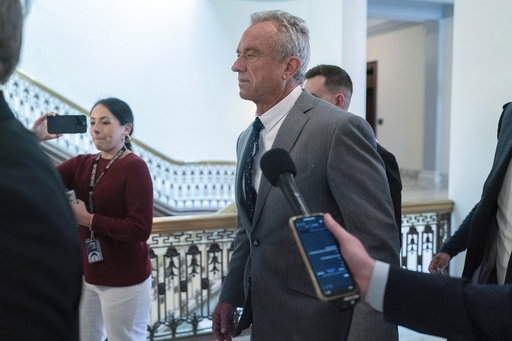WASHINGTON — Dolores Mejia, a retiree from suburban Phoenix, has observed an increase in the weight of children and parents in her community over recent years. At 75 years old, she also acknowledges her own challenges with weight management. This personal struggle led her to code Robert F. Kennedy Jr.’s campaign slogan, “Make America Healthy Again,” intriguing as it raised important questions regarding processed foods and their impact on the obesity crisis in the United States.
“I’ve always been fond of junk food,” Mejia stated. “I began to question where all those extra pounds came from.” Following her engagement with Kennedy’s suggestions, she reached a startling conclusion: “We simply cannot trust longstanding health organizations to inform us about the safety of our food.”
Republican voters like Mejia have shown strong support for Kennedy, especially following his alignment with Donald Trump, which could position him as a significant health official in the upcoming administration. Recent research indicates that many Republicans hold favorable views of Kennedy, aligning with Trump’s choice to include him in his Cabinet.
However, views on Kennedy are more varied among the general population, with significant skepticism toward some of his stances, especially concerning vaccines. If Kennedy is confirmed by the Senate, he would head the Department of Health and Human Services, a critical agency overseeing health-related research, drug approvals, and health insurance for approximately half the American populace.
Polling data reflect that around 60% of Republicans support Kennedy’s potential appointment, while around 10% disapprove. The remainder either lack familiarity with him or did not express a view. His presence is welcomed by far-right supporters, with influential figures like Heritage Foundation President Kevin Roberts praising Kennedy for highlighting the problematic connection between government, non-profits, and corporations that contribute to public health issues.
Natalie Moralez, a 32-year-old engineer from Albuquerque, New Mexico, has also taken note of Kennedy’s advocacy for healthier food options. An independent voter, Moralez is particularly interested in his commitments to challenge corporate practices that affect food quality. “When buying groceries, I constantly ask myself what else might be in those foods,” she reflected, hoping Kennedy can address fundamental issues within the food industry.
However, Kennedy’s overall reception remains lukewarm, with about 40% of U.S. adults expressing disapproval of his potential appointment, and only around 30% in favor. Despite being part of a prominent political family, significant resistance comes from Democratic voters, with 60% expressing strong disapproval of his Cabinet selection. This level of negative sentiment exceeds that directed at other notable appointments in the Trump administration.
Much of the opposition stems from Kennedy’s controversial anti-vaccine stance. Historically, he initiated his career as an environmental attorney, successfully litigating against companies linked to environmental hazards. In recent years, he has garnered a following for his claims about the dangers of vaccines, despite overwhelming scientific consensus affirming their safety and effectiveness in preventing diseases.
Kennedy has made statements asserting, “There’s no vaccine that is safe and effective,” and has revisited the debunked narrative linking vaccines to autism, with Trump echoing sentiments that the association should be investigated. Their supporters have assured the public that while they do not wish to eliminate vaccines, they intend to advocate for more research and to oppose mandates.
According to voter surveys, about half of adults prefer a more active role for the government in ensuring childhood vaccinations, whereas only about 20% support reduced government involvement. Parents of school-aged children showed slightly greater support for a reduced role in vaccination enforcement.
In the latest polling data, roughly 40% of voters had either a favorable or unfavorable impression of Kennedy during the most recent presidential race. His support is significant among Republican voters, with two-thirds viewing him positively, in stark contrast to only about 20% of Democrats. Notably, approximately 70% of Democrats believe negatively towards Kennedy, with half declaring a very unfavorable opinion.
As Kennedy’s influence expands within the Republican sphere, his battle against misinformation in the media continues, as his organization, Children’s Health Defense, pursues legal action against several news outlets for alleged antitrust violations related to their handling of health-related narratives. Despite stepping back during his presidential campaign, Kennedy retains ties to the organization, which further complicates his public perception.



